New Zealand general election, 1975
|
|
||||||||||||||||||||||||||||||||||||||||||||
|
||||||||||||||||||||||||||||||||||||||||||||
|
||||||||||||||||||||||||||||||||||||||||||||
|
||||||||||||||||||||||||||||||||||||||||||||
The 1975 New Zealand general election was held on 29 November to elect MPs to the 38th session of the New Zealand Parliament. It was the first general election in New Zealand where 18- to 20-year-olds and all permanent residents of New Zealand were eligible to vote, although only citizens were able to be elected.
The incumbent Labour Party, following the sudden death of Labour leader Norman Kirk, was led by Bill Rowling, a leader who was characterised as being weak and ineffectual by some political commentators. Labour's central campaign was the so-called "Citizens for Rowling" petition which attacked National leader Robert Muldoon's forthright leadership style. This campaign was largely seen as having backfired on Labour.
The National Party responded with the formation of "Rob's Mob". As former Minister of Finance in the previous National government, Muldoon focused on the economic impact of Labour's policies. National's campaign advertising suggested that Labour's recently introduced compulsory personal superannuation scheme would result in the Government owning the New Zealand economy using the workers's money (akin to a communist state). Muldoon argued that his New Zealand superannuation scheme could be funded from future taxes rather than an additional tax on current wages.
The campaign achieved notoriety due to an infamous television commercial featuring "Dancing Cossacks" which was produced by Hanna Barbera on behalf of National's ad agency Colenso.
A consummate orator and a skilled television performer, Muldoon's powerful presence on screen increased his popularity with voters.
The final results of election: National won 55 seats, and Labour 32 seats. Thus Robert Muldoon replaced Bill Rowling as Prime Minister, ending the term of the Third Labour government, and beginning the term of the Third National government. The party seat numbers were an exact opposite of the 1972 election. No minor parties won seats. There were 1,953,050 electors on the roll, with 1,603,733 (82.11%) voting.
...
Wikipedia


